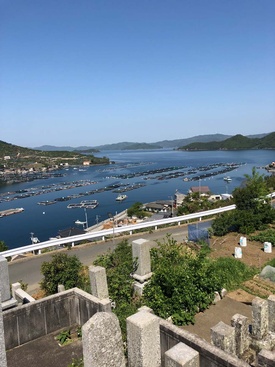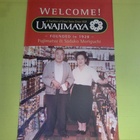For Japanese people, if you want to trace your roots, the best thing to do is generally go to your local government office and look up your family register. If you have a family temple, you can also check the death registers that are kept by the temple, which are records of your ancestors.
The graves of the Moriguchi family, the founding family of Uwajimaya, are kept at Gyohanji Temple (a Rinzai sect temple) in Yawatahama City, where records of successive generations remain. However, in the case of the Moriguchi family, it seems that the complex family relationships, including past adoptions, can only be clarified by tracing the family register.
The founder, Fujimatsu Moriguchi, was born in Kawanazu, formerly Kawakami Village, in 1898 (Meiji 31) as the eldest son of his father, Gonshichi Moriguchi, and mother, Suwa. In addition to Fujimatsu, the Moriguchi family had two other children: the eldest daughter, Kame, the second daughter, Kinoe, the second son, Saisuke, the third daughter, Kikuko, the fourth daughter, Haruko, the fifth daughter, Kanako, the sixth daughter, Ishino, and an adopted daughter, Macino, between the fourth and fifth daughters, making a total of two sons and seven daughters.
His father, Gonshichi, was born in 1870 (Meiji 3), and his father, Matsuzo Moriguchi, was born in 1834 (Tenpo 5), and his father was Usaburo Moriguchi. The Moriguchi family is a branch family, and the main Moriguchi family is in the same Kawanazu village, and both the main family and the branch family have their graves in a corner of the cemetery, which is like a stepped field overlooking the sea at Gyohanji Temple.
Fujimatsu passed away in Seattle in August 1962 at the age of 64. According to his family register, "He died at 4:15 p.m. on August 3, 1932 in Seattle, Washington, United States of America. Reported by his cohabiting relative, Moriguchi Sadako. Received by the Consul General of Japan in Seattle on November 20, 1933. Delivered and removed from the family register on December 17, 1933."
Kubota Bamboo Sword and Fuji Pine
There are no records left about Fujimatsu, who left his hometown for the United States in 1923 (Taisho 12), including his time in his hometown, what he thought, what he aimed for when he went to the United States, and other personal details about him. However, we can imagine the general story from the story of a man who, coincidentally, left the area around the same time and went to Seattle, where he was successful.
The man in question is Takemitsu Kubota, a relative on Fujimatsu's mother's side, who was a huge success in the real estate business, including running a hotel in Seattle. His life has even been made into a TV program, centered around an interview he did when he returned to Japan at the age of 84.
In a documentary produced by Television Ehime titled "Ehime People and Their Culture" (winner of the 1984 Japan Commercial Broadcasters Association Award, Best Television Broadcasting Activity Category), Kubota passionately talks about what his hometown was like before he moved to the United States, his work and hardships after moving to the United States, and what he felt when he looked back on his hometown and Japan after achieving success.
Kubota was from Kawanazu, the same place as Fujimatsu, and was born in 1902, four years after Fujimatsu. He came to the United States one year after Fujimatsu. They were friends from the same hometown who both started out with nothing and became successful. During his lifetime, Kubota said, "Uwajimaya is our pride." He had a deep respect for Uwajimaya, not only because he was a successful man from the same hometown, but also because he continued to run a business that handled Japanese ingredients and contributed to the benefit of Japanese residents in the United States.
After he became successful, he worked for Japanese and Japanese-Americans, such as taking care of fellow Japanese who had immigrated to Seattle, and served as the president of the Seattle Japanese Community. This is similar to the attitude of Fujimatsu and his wife Sadako, who volunteered to provide food from Uwajimaya to Japanese and Japanese-Americans in need.
Like many Japanese, when Kubota first came to America, he thought he would save up money in a few years and then return home. However, it wasn't that easy, and he "worked day and night," working as a railroad mechanic in Montana and various jobs in Seattle. He thought about graduating from college in America and making a living, but he says, "That takes a lot of time. Nisei can graduate from college and become a lawyer, but lawyers can be hired with money. So I decided to live off money."
In this way, he desperately saved up money and ran a simple lodging house, which he then expanded and eventually acquired a full-fledged hotel, making his business a success.
After the war, he gained citizenship, but his hometown and Japan were always in his heart, and he would often return home and show his hometown on the show accompanied by his grandchildren. Fujimatsu also wanted to bring his family back to his hometown of Kawanazu to maintain his ties with Japan. Kubota also worked for many years after the war publishing the local Japanese newspaper, "Hokubei Hochi." Although it was a tough business, he felt it was important for it to continue for the sake of the Japanese community in Seattle. Today, Hokubei Hochi is supported by Tomio Moriguchi, former chairman of Uwajimaya, who succeeded Fujimatsu as the founder of the company's revival, and this may also be a connection that was forged through his hometown.
(Titles omitted)
© 2018 Ryusuke Kawai







